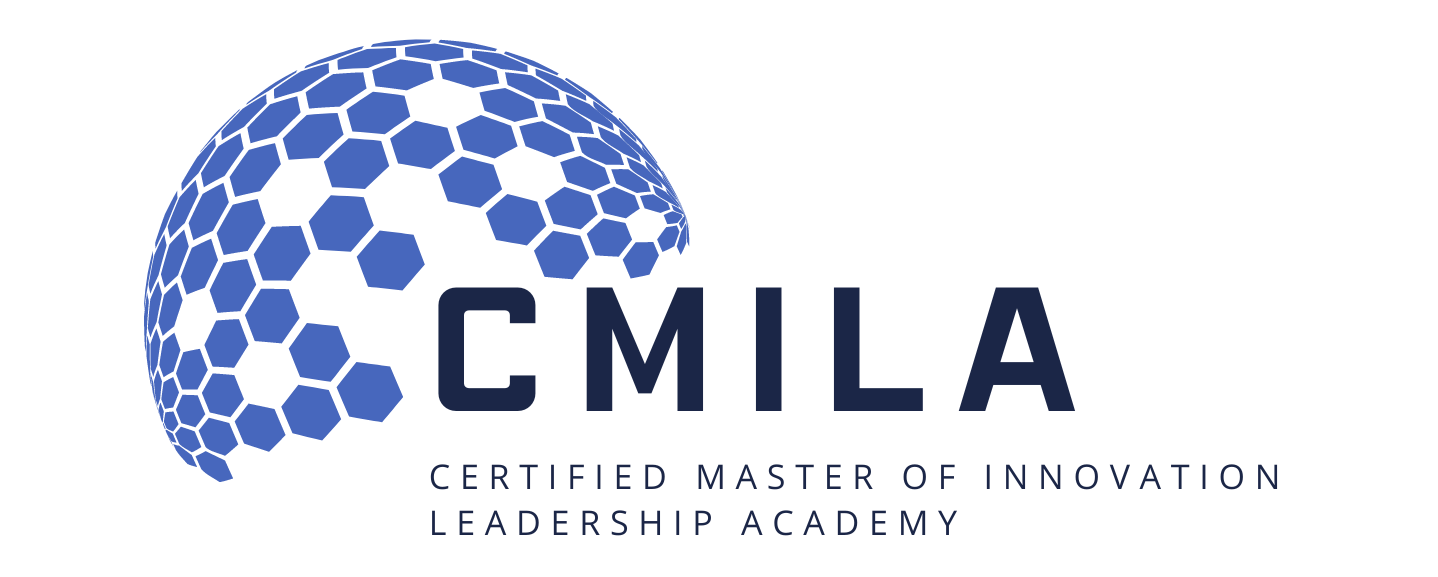Resources

The CMILA certification would position holders as leaders adept at driving change and fostering a culture of innovation within their organizations or industries.
The Certified Master of Innovation Leadership Academy (CMILA) is a prestigious academy designed to equip current and aspiring leaders with cutting-edge skills, knowledge, and strategies for driving innovation and creativity within their organizations. As a comprehensive educational initiative, CMILA aims to foster a new generation of leaders capable of navigating the complexities of the modern business landscape, embracing change, and leading transformative initiatives.
Core Curriculum Topics
Foundations of Innovation: Understanding the principles and practices of innovation, including different types of innovation and how they can be fostered within an organization.
Creative Leadership: Techniques and strategies for leading teams in a way that encourages creativity, risk-taking, and innovative thinking.
Design Thinking: Training in design thinking methodologies to solve complex problems and identify innovative solutions.
Change Management: Skills for effectively managing organizational change, overcoming resistance, and embedding an innovation culture.
Strategic Foresight: Developing the ability to anticipate and prepare for future trends and challenges, using strategic foresight tools and techniques.
Innovation Ecosystems: Understanding how to create and nurture ecosystems that support innovation, including partnerships, collaborations, and networks.
Digital Transformation: Insights into leveraging digital technologies to innovate business models, processes, and customer experiences.
Leadership Development
- Emotional Intelligence: Building emotional intelligence to lead diverse teams and foster a collaborative and inclusive work environment.
- Ethical Leadership: Guidance on ethical decision-making and leading with integrity, especially when navigating the complexities of innovation.
- Personal Branding as an Innovator: Developing a personal brand that positions the leader as an innovator and thought leader in their field.
Practical Application
o Capstone Projects: Participants should undertake a capstone project where they apply what they’ve learned to a real-world challenge within their organization or industry.
o Innovation Labs: Hands-on workshops or labs where participants can experiment with new ideas and technologies under the guidance of experts.
Networking and Mentorship
o Mentorship Program: Pairing participants with experienced innovators and leaders who can provide guidance, feedback, and support.
o Community of Practice: Access to an exclusive community of innovation leaders for networking, collaboration, and shared learning.
• Continuous Learning and Support
• Resource Library: Access to a curated library of resources, including articles, case studies, and tools for continuous learning.
• Webinars and Workshops: Regularly scheduled webinars and workshops on the latest trends, tools, and techniques in innovation leadership.
• Certification Process
o Assessment and Evaluation: Rigorous assessment through examinations, project presentations, and peer evaluations to ensure mastery of the material.
o Certification: Upon successful completion, participants are awarded the Certified Master of Innovation Leadership (CMIL) designation, recognizing their achievement and expertise.
Target Audience
o The CMIL program is designed for:
o Senior executives and managers looking to lead innovation initiatives within their organizations.
o Entrepreneurs and business owners aiming to embed innovation into their business strategies.
o Professionals in leadership roles seeking to enhance their skills in driving creative problem-solving and innovation.
• The CMIL program aims not only to impart knowledge but also to transform mindsets, enabling leaders to cultivate environments where innovation thrives, thereby driving sustained growth and competitive advantage.
Program Objectives
• Cultivate Innovation Leaders: Develop leaders who can create, implement, and sustain innovation strategies in various organizational contexts.
• Enhance Creative Problem-Solving: Equip participants with tools and methodologies to solve complex challenges creatively and effectively.
• Drive Organizational Change: Prepare leaders to act as catalysts for change, driving organizational transformation and growth.
• Build Strategic Foresight: Foster the ability to anticipate and adapt to future trends and disruptions.
Curriculum Overview
• The CMILA curriculum integrates theoretical knowledge with practical application, structured around the following core modules:
• Innovation Fundamentals
o Principles of innovation and creativity
o Types and models of innovation
o Building an innovation-oriented culture
• Leadership in Innovation
o Leadership theories and styles conducive to innovation
o Emotional intelligence and team dynamics
o Ethical leadership and decision-making
• Strategy and Execution
o Strategic planning for innovation
o From idea to execution: Operationalizing innovation
o Measuring and scaling innovation impact
• Change Management and Organizational Behavior
o Dynamics of change within organizations
o Strategies for managing resistance and fostering buy-in
o Communication and influence for innovation leaders
• Technology and Digital Transformation
o Leveraging technology for innovation
o Digital transformation strategies
o Emerging technologies and their potential impact
• Creative Problem-Solving and Design Thinking
o Design thinking methodologies
o Creative problem-solving techniques
o Prototyping and testing innovative solutions
Ready To Get Certified ?
As a comprehensive educational initiative, CMILA aims to foster a new generation of leaders capable of navigating the complexities of the modern business landscape, embracing change, and leading transformative initiatives.
